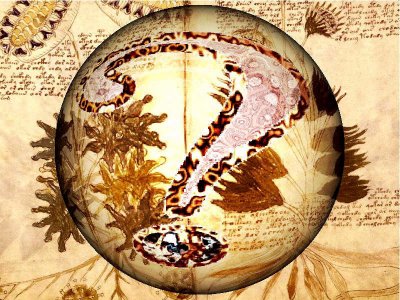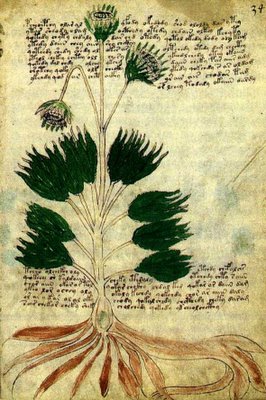
The other day, while I was looking online for information about a book - that does not allow itself to be read - mentioned in an Edgar Allan Poe story, I came across an article by sometime Time magazine book reviewer and novelist Lev Grossman. The piece is called When Words Fail and dates from the late 1990s. Subsequent checking suggests that not all of the information in the article is accurate or up to date but it will do as a summary introduction.
The Voynich Manuscript is, literally, a book that cannot by read, since it is written in an unknown language or else in a cipher no-one has yet decoded, at a time of which no-one is sure, by a hand that has not been identified. It is named for one Wilfrid M. Voynich, an American rare book dealer who found it in 1912 in the library of the Villa Mondragone, a Jesuit college in Frascati, Italy, near Rome. The Jesuits who owned the manuscript knew almost nothing about it. Recognising it as unusual and potentially valuable, Voynich bought it and took it back with him to America.
He circulated copies of the pages to scholars he thought might be interested in deciphering it: paleographers, medieval historians, cryptographers, linguists, philologists, even astronomers and botanists. (The book is beautifully illustrated with botanical drawings, astrological symbols, maps, and other arcana.) To date, nearly a hundred years later, no-one has succeeded, although many have tried and some have destroyed themselves in the attempt.
Evocative names swirl about the Voynich: St. Hildegard von Bingen, Roger Bacon, Doctor Dee and Edward Kelly, Rudolph II of Bohemia .... between the pages of the book was a letter, the date of which is probably 1666, from Johannes Marcus Marci of Kronland, rector of the University of Prague, to polymath Athanasius Kircher, a Jesuit famous for trying and failing to decipher Egyptian hieroglyphics and for having himself lowered into the crater of Vesuvius to observe the play of subterranean forces. Kircher was also the author of one of the earliest attempts at devising a universal language and Marci was seeking advice re: deciphering.
So the book was certainly in Prague in the mid-seventeenth century, and may have been purchased by Rudolph for a large amount of money late in the sixteenth; but where it was before that remains a matter for speculation. Many scholars think the physical object dates from early in the 1500s but, even so, it may still be a copy of an earlier book; on the other hand, it may be a hoax especially concocted to fool the King of Bohemia into parting with 300 crowns.
Currently massive efforts through interlinked Web sites are under way to solve the mystery once and for all ... but part of me wonders if it might not be better to leave something as strange and beautiful as this is, alone?


No comments:
Post a Comment